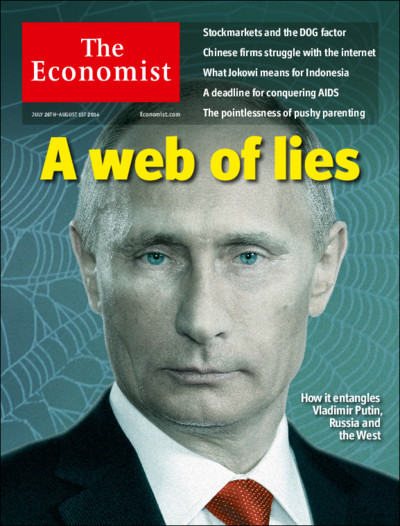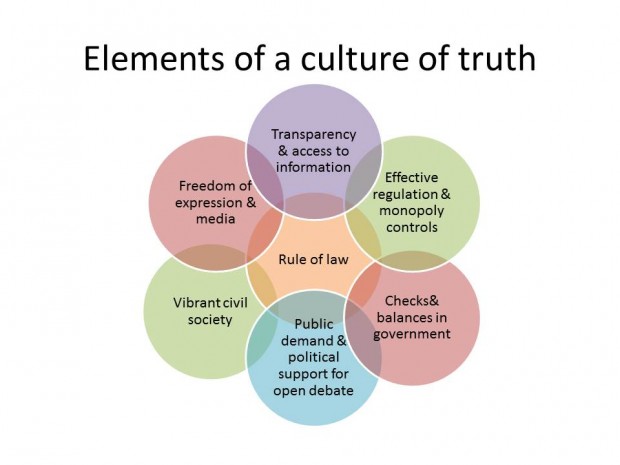False facts are a problem everywhere; In developing countries, they’re devastating
Accusations of inaccuracies in the news media are nothing new. After all, American journalism went through its infamous “yellow” period at the end of the 19th century when invented stories helped drive the US to war with Spain.
But if you thought that the digital age had put an end to all of that, think again. The media world is being roiled by a new wave of misrepresentations that set new standards for perfidy.
 In the last month alone, Russian President Vladimir Putin made the cover of The Economist with the headline “A Web of Lies,” one of many commentaries bemoaning the barefaced distortions and conspiracies that are being propagated in the Kremlin-controlled Russian media. Other false facts appeared prominently in the coverage of the Ferguson, MO, police killing of an unarmed teenager. Long-simmering factual controversies about the Affordable Care Act (“Obamacare”) also continued, all while the conflict in Gaza generated its own errors, half-truths and worse.
In the last month alone, Russian President Vladimir Putin made the cover of The Economist with the headline “A Web of Lies,” one of many commentaries bemoaning the barefaced distortions and conspiracies that are being propagated in the Kremlin-controlled Russian media. Other false facts appeared prominently in the coverage of the Ferguson, MO, police killing of an unarmed teenager. Long-simmering factual controversies about the Affordable Care Act (“Obamacare”) also continued, all while the conflict in Gaza generated its own errors, half-truths and worse.
The New York Times last year chronicled the explosion in fake or embellished stories running riot on the Internet, noting the diminished incentives for websites to correct anything that generates a lot of lucrative advertising dollars. That followed The Atlantic’s coverage of groups that created “brigades” of internet users with fake identities to bury comments that they didn’t like and to put forward alternative, and often fabricated, facts.
All of this is happening at a time when satirical news programs like the Daily Show or online sites and print publications like The Onion have managed to draw a younger audience into the news. These satirical initiatives can actually generate interest in current events (even if it sometimes confuses a few gullible people). Most people get the jokes and may actually become better informed as a result. The Egyptian satirist Bassem Youssef was forced to cancel his daily show earlier this year after repeatedly angering authorities.
But misrepresentation with intent to deceive can have a much more nefarious impact. Arch Puddington, vice-president of research at Freedom House, wrote this week that Russian propaganda has been successful in convincing a majority of Russians that Ukraine is guilty of “massive war crimes, including the crucifixion of small children and the downing of the Malaysian Airlines passenger jet.”
Building cultures of truth in the developing world is all the more challenging in an era when fully developed countries are perfecting the art of selling lies. While it has never been easier to expose an error, verify a fact or seek the expertise of multitudes through “crowdsourcing,” the Internet and social media has made it easier for rumors and lies to spread like wildfire until they can be debunked—often too late to undo all the damage.
The extent of false news is difficult to quantify. One tally by PunditFact (affiliated with the fact-checking organization PolitiFact) of the statements by pundits on U.S. television stations yielded stunning levels of truth-parsing on the air. Fully 60 percent of the claims checked on Fox News were rated “mostly false,” “false,” or, their most damning rating, “pants on fire.” NBC and MSNBC weren’t far behind, with 46% of the claims rated as mostly false or worse. While the claims to be checked are selected by PunditFact and by no means cover all of the content on these channels, even the best rated networks suggest that people need to have multiple sources of information and to treat so-called experts with a grain of salt.
As bad as all this is for citizens in the developed countries, nowhere is the impact of false facts more harmful than in developing countries. Countries with underdeveloped economies and weak democracies often lack the supporting institutions that can over time correct falsehoods in the media. This in turn undermines accountability, makes investors wary of investing, and allows corruption and misgovernance to flourish.
In Russia in the 1990s under the presidency of Boris Yeltsin, for example, newly liberated media outlets uncovered many examples of corruption, abuses of power, and mismanagement. Yet the lack of an independent judiciary or other checks and balances in the governance system meant that many of these abuses went unchecked. Over time, Russians became cynical about press revelations and often blamed the media for scandal mongering, and the murders of journalists soared. When Putin came to power, it only took a few years for him to bring the country’s media outlets under nearly total control.
The Media Sustainability Index measures a number of dimensions of media performance that may suggest the scale of the problem for developing countries. In addition to free speech and access to information, the MSI measures journalistic quality (fair and objective reporting, ethical behaviors, and lack of corruption, for example) as well as diversity of news sources (reflecting a variety of viewpoints, citizen access to all domestic and international news sources, and independent news gathering and production). In its most recent 2013 report on Europe and Eurasia, for example, only six of the 21 countries surveyed reached a “near sustainability” score in professional journalism, with all 15 others falling in the two “unsustainable” categories.
Creating a culture of truth-telling and fact-based governance is complex and never finished exercise, even for the most advanced countries. And while a free and independent media plays a central role in creating such a culture, it requires an array of supporting laws, institutions, behaviors and practices that constantly need to be upgraded, revised and defended.
The international community should focus more attention on the problem of helping countries establish the incentives and intuitions for a culture of truth-telling. This means not only supporting media development efforts at the sector level to improve journalist practices and quality, but also linking this with broader institutional reforms. This will mean a constant effort to convince leaders and citizens of developing countries that the truth matters. And on this front, we in the West are hardly setting the best example.


Comments (0)